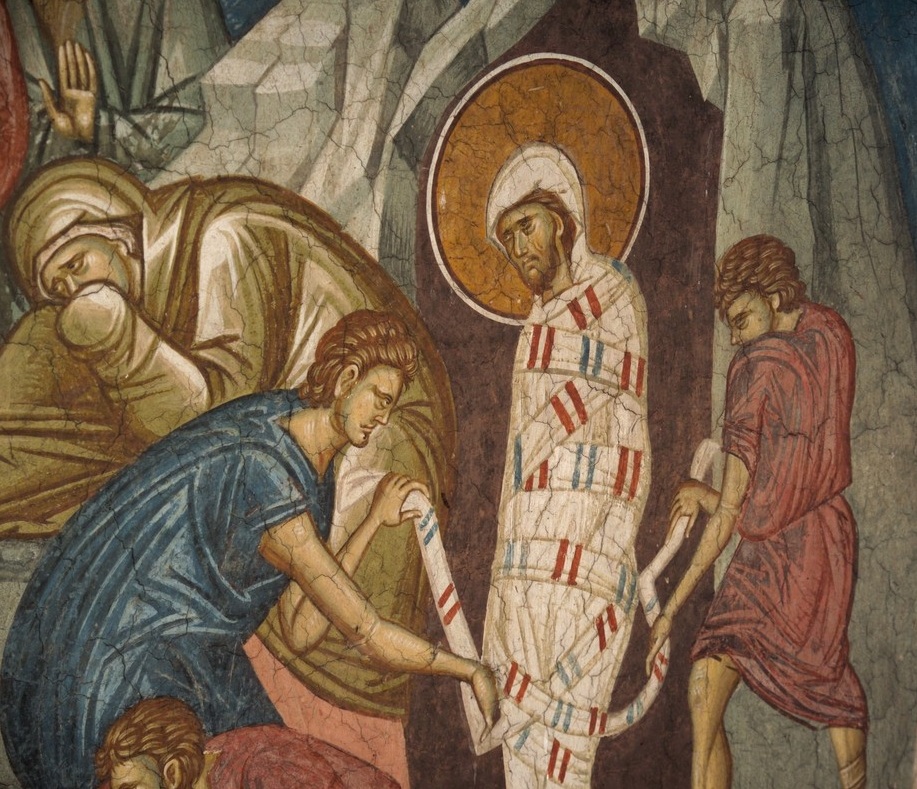John 11:44On the day that my Aunt Katherine died I smelled roses all day. It was not because I was in a rose garden; in fact, I was working in a soup kitchen. I remember going outside, and into the dining room, looking for roses, but there were none. Later I learned that Katherine had died that day and I remembered the roses. It seemed like such an strange thing that I looked back in my journal and, sure enough, it said, “Oddly, I smelled roses all day. It was very distinct.” But, you want to know a secret? Ever since then, every time I smell roses it’s as if Aunt Katherine is with me, and in some way I guess she is. The courage and dreams that she helped me find as a child become real to me again as an adult, enlivening, comforting, and reminding me who I am. If you ask me, Aunt Katherine is a saint. I am certainly in some kind of communion with her; even though she is dead, she is alive to me. Her spirit nudges me to help others find their courage and their dreams. That satisfies my definition of a saint.
There are different formulas for becoming a saint, of course. I don’t get to decide about all the saints, just my own. Actually being recognized as a saint depends on which brand of Christianity you practice, and the formulas change from time to time. Most recently the requirement of waiting has been waived for potential Roman Catholic saints like Mother Teresa. Her Canonization process began only two years after her death. Potential Coptic saints, on the other hand, must wait at least fifty years before being considered. Saint Bede had to wait 1,164 years before he was made a saint. Yet for Lutherans, Baptists, and most protestants, just being a Christian, living or dead, is enough to make you a saint.
Not only is it hard to know who the saints are, it’s hard to keep up with the sheer numbers of them. During the first thousand years of Christianity local congregations proclaimed their own saints, and because of that it is impossible to know how many saints there really are. The Roman Catholics did begin to organize things somewhat in 993 when Pope John XV canonized St. Ulrich of Augsburg. The institutional church seems to have got a better handle on things since then. At least it’s somewhat organized, though we unruly protestants have our Aunt Katherines, et al.
Like some of you, I have spent a lot of time this week thinking about the saints who are important to me: Aunt Katherine, among them. I wonder if during this time of commemoration and remembrance I might have some insight from them. Some people say that this is a thin time, a time when the dead are closer than usual.
So far, I am still waiting.
The saints have not spoken.
While I was waiting, though, I went about my regular activities and I found some other saints: In my office I found a woman struggling with meaninglessness and uncertainty. She thinks there might be something to religion, you know? In the neighborhood park I discovered that the man who sells boiled peanuts just lost his wife. “She no old,” he told me. He seemed so sad. Here on my little street a young woman, mildly retarded, grieved the death of her kitty cat. Mr. Tang made me coffee. The old man fixed the light on my helmet… and in each instance I thought, “Well, here is a saint… here is a living saint, right in front of me,” and I felt a little foolish for all my waiting and hoping that one of the usual saints would somehow come through for me.
I think it is hard to be a saint today, much as it always has been. That is why we have the communion of saints; We have one another. You may remember that when Jesus raised Lazarus from the dead he did not take the death clothes off of Lazarus, he told the others to do it: “(you) Unbind him, and let him go.” That is our part: To unbind, to help people recognize themselves as saints, and to free them from the entangling culture of death which chases us like the devil it is.
But, how can people become saints? As long as we allow death culture to reign over kingdom culture people can’t become saints. Death culture makes it impossible for people to do anything except survive. But — and this is the good part — with God all things are possible. We can move from being a society of survivors to a society of thrivers, but only if we help one another. We have to unwrap those death clothes and disencumber one another so that we can all become saints.
When we learn how to help new saints emerge, instead of just hoping that the old ones show up we are bringing the kingdom of Love, a little closer. The question is what can we do today?
Can you feed somebody? Saints need food.
Is there somebody you can encourage? Do it!
If you know somebody who needs a friend, go be one.
If you have status or privilege, how can you use that to free those who don’t have the same resources?
We don’t have to live in these death clothes! Unbind one another, and live!
Linda McMillan lives in Shanghai, China and looks for saints around every corner.
Image: The Raising of Lazarus (detail: Lazarus), 14th century, Decani Monastery

